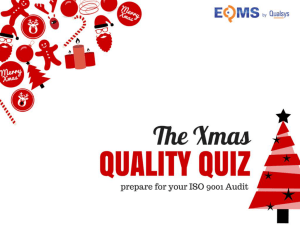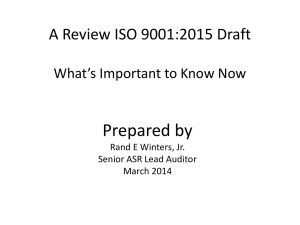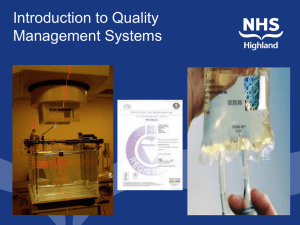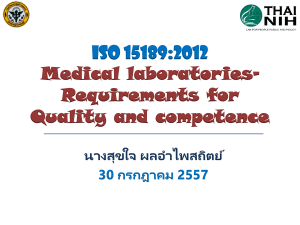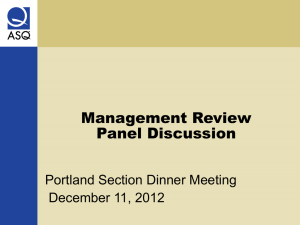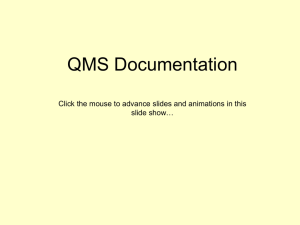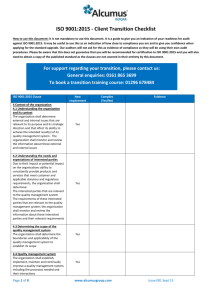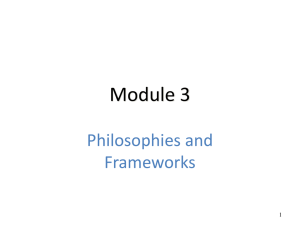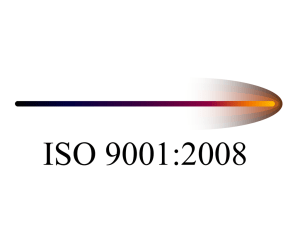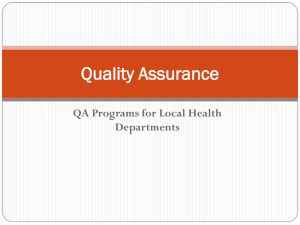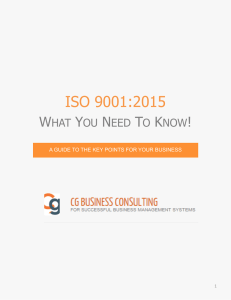WHY ISO 9001 QMS
advertisement
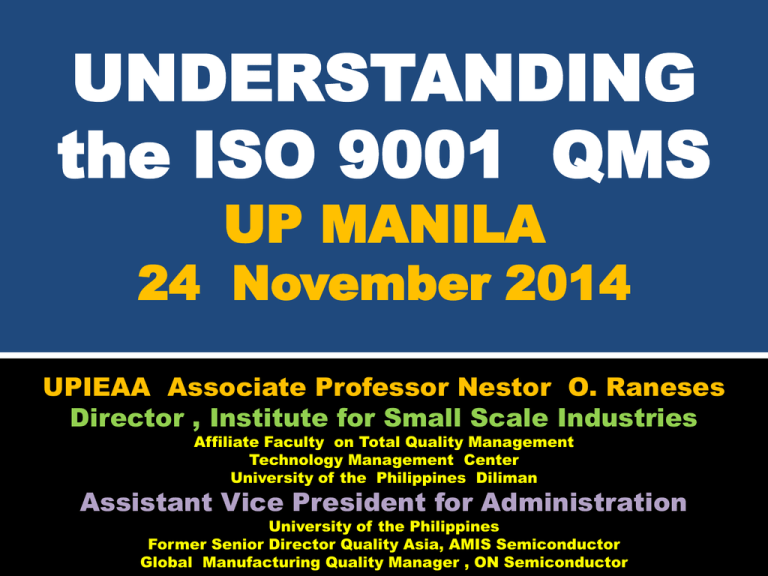
UNDERSTANDING the ISO 9001 QMS UP MANILA 24 November 2014 UPIEAA Associate Professor Nestor O. Raneses Director , Institute for Small Scale Industries Affiliate Faculty on Total Quality Management Technology Management Center University of the Philippines Diliman Assistant Vice President for Administration University of the Philippines Former Senior Director Quality Asia, AMIS Semiconductor Global Manufacturing Quality Manager , ON Semiconductor GREETINGS • • Creating and Empowering Filipino Entrepreneurs Today & Tomorrow National Institute for Innovation and Entrepreneurship GREETINGS ASEAN CENTER OF EXCELLENCE for SME DEVELOPMENT – PHL • Usaping Pangnegosyo, Ilaw, Salamin at Sandata ng Industryang Pilipino • • UP ISSI P AGENDA • QUALITY OVERVIEW • QUALITY MANAGEMENT STANDARDS – WHAT & WHY • LEGAL BASIS FOR QMS • ISO 9001 QMS – WHAT IS IT ? • UNDERSTANDING ISO 9001 REQUIREMENTS • IMPLEMENTING ISO 9001 • QUESTIONS AND ANSWERS • NEXT STEPS CUSTOMER FOCUS DISCIPLINED PROCESSES CONTINUAL IMPROVEMENT MANAGING PROCESS CHANGE STRUCTURED PROBLEM SOLVING THE NATURE OF QUALITY • Exceeding Customers’ and the Organisation’s Needs • DNA of an organization • Assuring Quality Systematically • Prevention Culture • Right First Time • Continuous Improvement QUALITY TERMINOLOGY • QUALITY CONTROL = CORRECTION • QUALITY ASSURANCE = PREVENTION • QUALITY MANAGEMENT = DESIGN CUSTOMER SATISFACTION AND CONTINUAL IMPROVEMENT WHY TQM? “Do the right things right the first time, every time.” Total Quality Management • TQM T = TIME •Q = QUALITY •M = MONEY 11 QUALITY • Quickly • • • • • • Understand & Act On Losses Innovatively Technical ( Theoretical ) Yield 13 TOTAL QUALITY “ QUALITY is the transformation in the way we think and work together, in what we value and reward, and in the way we measure success. “ “All of us collaborate to design and operate a seamless value-adding system– all optimizing for a common purpose “ TOTAL QUALITY MODEL TRANSFORMATIVE Government Quality Management System Standards (GQMSS) QMS LEGAL BASES REPUBLIC ACT NO. 9013 28 FEBRUARY 2001 “ AN ACT ESTABLISHING THE PHILIPPINE QUALITY AWARD IN ORDER TO ENCOURAGE ORGANIZATION IN BOTH PRIVATE AND PUBLIC SECTOR TO ATTAIN EXCELLENCE IN QUALITY IN THE PRODUCTION AND/OR DELIVERY OF THEIR GOODS AND SERVICE” QMS LEGAL BASIS EXECUTIVE ORDER NO. 605 23 FEBRUARY 2007 “INSTITUTIONALIZING THE STRUCTURE,MECHANISMS AND STANDARDS TO IMPLEMENT THE GOVERNMENT QUALITY MANAGEMENT PROGRAM” QMS LEGAL BASIS DBM CIRCULAR LETTER NO. 2008-8 23 OCTOBER 2008 NATIONAL GUIDELINES ON INTERNAL CONTROL SYSTEMS (NGICS) CHAPTER 3, COMPONENTS OF INTERNAL CONTROL, SECTION 3.1 CONTROL ENVIRONMENT QUALITY MANAGEMENT SYSTEM QMS LEGAL BASIS DBM CIRCULAR LETTER NO. 2011-05 MAY 19,2011 “PHILIPPINE GOVERNMENT INTERNAL AUDIT (PGIAM) ” Generic Module on Controls in QMS GCG Circular No. 2013-02 April 29,2013 No. 6 letter e “ Government Quality Management System Standards (GQMSS) pursuant to E.O. No. 605 s. 2007 • MANAGEMENT To be really efficientSYSTEMS and effective, the organization should do actions systematically . • Nothing important is left out. • Everyone is clear about who is responsible for doing what, when, how, why and where. • Management system standards provide the organization with an international, state-of-the-art model to follow. QUALITY MANAGEMENT SYSTEM – QMS • Defines the framework in establishing, monitoring and improving satisfaction of customer requirements in any organization • Directs and control an organization with regard to quality • Assesses if a process is working, if things are being done in the way they are supposed to be done WHAT IS ISO QMS ? • An International Standard for Quality Management Systems • Covers the planning, the management and operation of any Organisation • Assures customers of your reliability and competence to deliver what you promise WHY ISO 9001 QMS ? • International & expert consensus on state-of-the-art practices for quality management. • Common language for dealing with customers and suppliers worldwide in B2B. • Increase efficiency and effectiveness. • Model for continual improvement. WHY ISO 9001 QMS ? • Model for satisfying customers and other stakeholders. • Build quality into products and services from design • Integrate with global economy. WHY ISO9001 QMS ? • Sustainable business • Unifying base for industry sectors • Qualify suppliers for global supply chains • Technical support for regulations WHAT ARE THE INTERNAL BENEFITS OF ISO QMS ? Less Waste of Time and Effort Improved Efficiency and Effectiveness Fewer Complaints Culture of Problem Prevention, Continuous Improvement • Culture of innovation and excellence • Focus on Customer Service and Organizational Results • • • • EIGHT QUALITY MANAGEMENT PRINCIPLES Customer Focus Leadership Involvement of People Process Approach System Approach to Management Continual Improvement Factual Approach to Decision Making • Mutually Beneficial Supplier Relationships • • • • • • • The ISO 9001:2008 certification signifies a global benchmark in customer satisfaction, product quality, and leads to significant reduction in defect levels. GENERAL STEPS TO ISO 9000 CERTIFICATION • • • • • • • • • • • Initial Audit and Review Management Commitment Management Steering Group Quality Training for all staff Write Quality Manual Map Core Processes Train QMR and Auditors Implement and Test Internal Audits Management Review External Accreditation ISO is a worldwide federation of national standards bodies ISO International Organization for Standardization Adoption of a Quality Management is a strategic decision. Process based Quality Management System Model Continual Improvement of the quality management system CR U EQ SU TI R OE MM E EN RT SS C U S T O M E R Management Responsibility Measurement, Analysis & Improvement Resource Management Input Value-adding activities Product Realization Information flow Output Product S S A T I S F A C T I O N 39 WITH WHO WITH WHAT (Eqpt/Installations) INPUT What should we receive ? HOW MANY R E Q U I R E M E N T S (Performanc e Indicators) (Training, Knowledge, Skills) R E Q U I R E M E N T S PROCESS CONTINUAL IMPROVEMENT CUSTOMER OF THE QMS CUSTOMER REQUIREMENTS Mgt. Responsibilit y Resource Mgt. SATISFACTIO N Measurement Analysis & Improvement Product Realization OUTPUT OUTPUT What should we deliver? HOW (Instructions, procedures, methods DEVELOPING A QUALITY SYSTEM Quality Policy Quality Strategy Quality Manual Procedures Work Instructions VISION/ MISSION/COREVALUES / QUALITY POLICY STATEMENTS HOW POLICY IMPLEMENTED. QP+QS +Quality System&Standards Are Applied. How Processes Which Affect Quality Are Carried Out. How Specific Jobs/Tasks Are Carried Out & Recorded DOCUMENTATION • Written Policies, Process Maps and Training Documents • Standard Methods of Best Practice • Process Approach • Authorisation and Control • Evidence of Compliance REASONS FOR DOCUMENTING PROCESSES • Defines clearly who are responsible • Assures work is done in a consistent way • Assures work is done to the same high standard • Useful for training new personnel Plan Do Check Act Cycle “Plan” what you will Do “Do” according to your Plan “Check” to see if you did what you planned “Act”, change or improve the part of your Plan or Do that did not give you the results you intended KEY CONCEPT OF ISO 9001 QMS “Say what you ,do and do what you say, show proof that you do it, and continuously improve “ Thank you for listening ISO 9001:2015 Timeline 2013 2014 May 2013 CD 2015 + Transition period for certification (Committee Draft) February 2014 DIS (Draft International Standard) February 2015 FDIS (Final Draft International Standard) September 2015 Published IS (International Standard) QUICK RECAP • ISO stands for International Organization for Standardization . • ISO 9001 specifies requirements for total quality management system. • Eight principles underpin ISO9001 QMS. • ISO 9001 QMS comprises 5 major elements or clauses . • QMS is a strategic decision . nraneses @gmail .com nestor.raneses@upd.edu.ph nestorraneses@yahoo.com UP STRATEGIC PLAN 20112017-PATH to GREATNESS …… “ This University must seize the leadership in the making of a globally competitive Philippines. But even more urgently, it should be focused on addressing those problems of the country that for decades have resisted solution.” One University One UP “The remaking of UP as a great university can only be achieved through our unified effort, and our individual and collective recognition that we are ONE UP. • • • • • • • We are One UP guided by One Charter, upholding the same tradition of honor and excellence. Moving UP toward greatness is possible through the unified effort of its students, faculty, researchers, administrative staff and alumni. As UP students, we are here to learn not just the knowledge and skills in abundance in our classrooms, libraries and laboratories, but also the life-lessons of our communities, our nation, and the world. As UP faculty, we are here to teach, and do meaningful research and extension work. As UP researcher and administrative staff, we are here to perform our duties with integrity and selflessness. As UP officials, we are here to further the values of democratic governance rooted in the imperative of consultations with UP’s constituencies. As UP alumni, we are the living embodiment of UP’s best achievements. As the national university, UP must lead our country toward true national development and global competitiveness while nurturing the spirit of our nationhood.” SAMPLE SWIN LANE CHART
